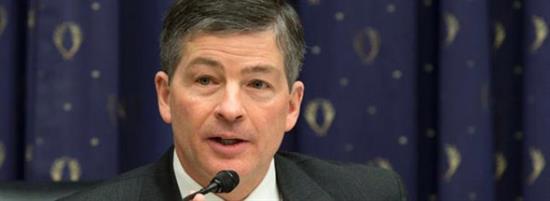Hensarling Opening Statement at Markup of Legislation to Empower Consumers and Job Creators
WASHINGTON,
September 30, 2015
Financial Services Committee Chairman Jeb Hensarling (R-TX) delivered the following opening statement at today’s full committee markup of five bills to empower consumers and job creators: The Committee meets to consider five important bills, the majority of them bipartisan and all of them designed to protect consumers and help build a healthier economy. Consumers are understandably concerned about our economy. We remain stuck in the worst recovery of the last 70 years. At the same time, they’re concerned that Washington is taking away their choices and raising many of their costs. Our committee has the privilege -- and responsibility -- to fight for them. Because every American -- regardless of which side of the tracks they grew up on, regardless of how humble their circumstances may be -- has the right to shape their own destiny; has the right to economic freedom and choice; and has the right to expect that Congress will work to build a healthier economy with more opportunities. Our committee has already guided 41 bills through the House this year, but we still have a lot of work to do. So let me begin by briefly reviewing today’s agenda. Millions of Americans plan their retirements based on advice from financial advisors. Unfortunately, the Department of Labor has proposed a rule that will make that advice unavailable or unaffordable. It will limit the right of Americans to choose the advisor they want and the investment products they currently enjoy. Those Americans hurt the most would be those with low and middle incomes. More than half of all House Democrats have joined Republicans in expressing these same concerns, and I commend them. This committee stands ready to protect consumers with H.R. 1090, offered by Mrs. Wagner. There is justifiable concern about income inequality in America. We must recognize that the root cause of income inequality is opportunity inequality. For those on the lower rungs of the economic ladder, burdensome government rules often smother opportunities to rise. When costly Washington mandates devour dollars that could otherwise be used to create jobs, the poor and unemployed are hurt the most. One such costly mandate is Section 953(b) of Dodd-Frank, which burdens every public company in America and will cost our economy billions of dollars with no material benefit. Even Mr. Frank of Dodd-Frank expressed skepticism, noting this provision came from the Senate and saying he hoped it could be “lessened as a burden” and ultimately changed. Thanks to the leadership of Mr. Huizenga, we have that opportunity today with H.R. 414. Just as the House should have been more deliberative before acceding to the Senate on Section 953(b), the National Credit Union Administration – the NCUA – should have been more deliberative with its proposed rule to amend risk-based capital requirements for credit unions. Many are concerned the NCUA’s proposal is a solution in search of a problem. Bipartisan legislation from Mr. Fincher, Mr. Heck, Mr. Posey and others simply requires the NCUA to examine these concerns and study appropriate capital requirements for credit unions. We’ll also consider two bipartisan bills that protect consumers and hardworking taxpayers by bringing needed accountability to the CFPB. No agency can truly protect consumers if it is unaccountable to them. The CFPB is perhaps the most powerful and most unaccountable federal agency in history -- a dangerous defect that stems from the Bureau’s structure. Unlike other federal agencies charged with consumer or investor protection, the CFPB is led by a single, all-powerful director -- unaccountable to the President, Congress and hardworking taxpayers. Second, the CFPB does not have an independent inspector general. Two bipartisan bills on today’s agenda will correct both of these flaws. With H.R. 957 introduced by Mr. Stivers, Mr. Walz and Mr. Royce, the CFPB will finally have an independent Inspector General. And with H.R. 1266 introduced by Chairman Neugebauer, Ms. Sinema, Mr. Scott and others, the CFPB will be governed by an accountable, bipartisan board. This is the very same structure that Democrats Elizabeth Warren, then-Chairman Frank, our current Ranking Member, and many others originally supported. They were clearly for it before they were against it. They will have another opportunity to be for it again today. Properly designed, the CFPB is capable of great good. Let’s pass these pragmatic, bipartisan fixes so the CFPB can be the accountable consumer protection agency all Americans deserve. |


